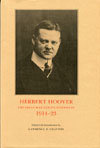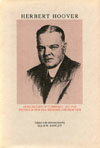Based on the latest Hoover scholarship, the essays in this volume provide valuable insights into a little-known period in the life of a much misunderstood American president. Hoover's basic economic and political views were in transition in these years. To understand his later actions as president, especially during the Great Depression, we must look to this formative period in this public career.
Lawrence Gelfand's general introduction and comments on each essay skillfully guide the layman as well as the Hoover specialist through major themes of continuing concern to Americans: the significance of voluntarism; the ideology of food relief; attitudes toward communism in the 1920s; the importance of foreign economic policy; and the necessity (as well as the pitfalls) for every aspiring young politician to create a positive public image.
"Rather than unconvincingly continuing to panegyrize Hoover, these essays are critically constructive and contribute more to a comprehensive and fair evaluation of his early years as a public figure than all previously published accounts."—Joan Hoff Wilson, Department of History, Arizona State University, and Guest Scholar, Woodrow Wilson International Center for Scholars
Contents
Preface
Introduction
Herbert Hoover, the Ideology of Voluntarism and War Organization During the Great War -Robert D. Cuff
Herbert Hoover, Launching the American Food Administration, 1917 -Witold S. Sworakowski
Hoover’s Reflections on the Versailles Treaty -Royal J. Schmidt
Hoover’s 1919 Food Diplomacy in Retrospect -Murray N. Rothbard
Herbert Hoover and the Russian Revolution -Eugene P. Trani
Herbert Hoover and the Economic Reconstruction of Europe, 1918-21 -Robert H. Van Meter, Jr.
Hoover and International Economics -Carl Parrini
Hoover’s Public Image, 1919-1920: The Emergency of a Public Figure and a Sign of the Times -Robert F. Himmelberg
Index

